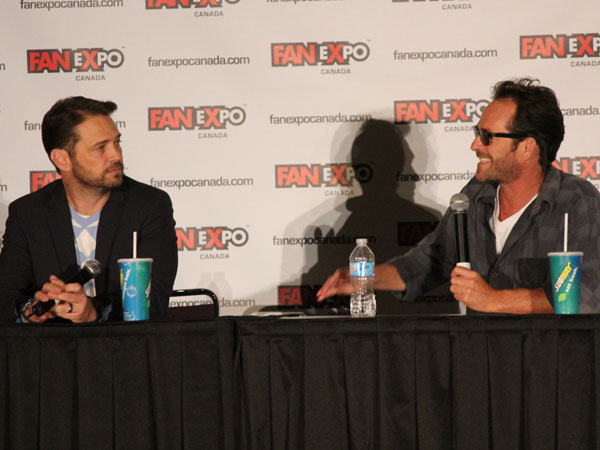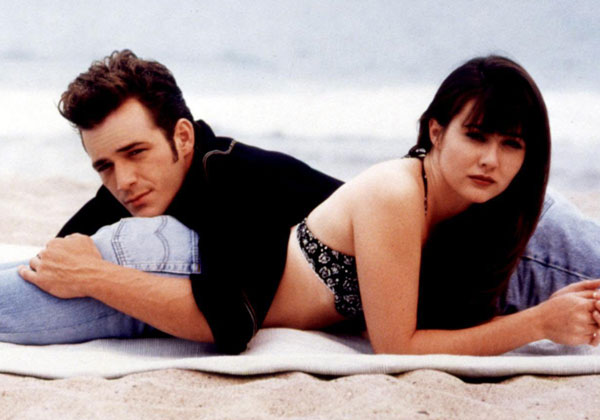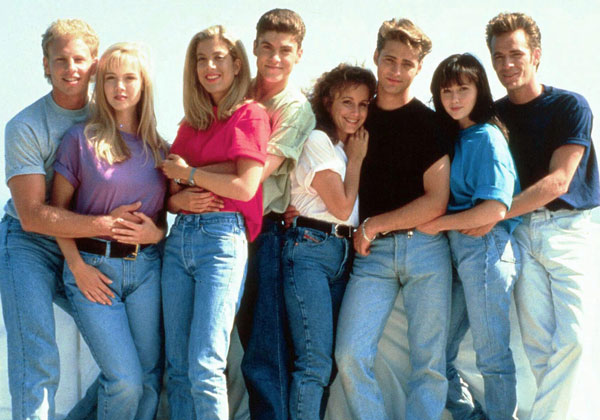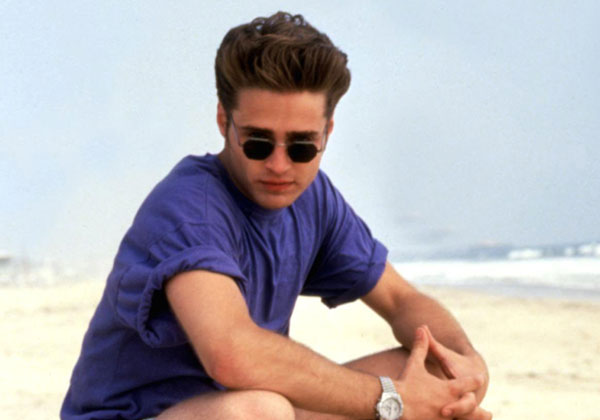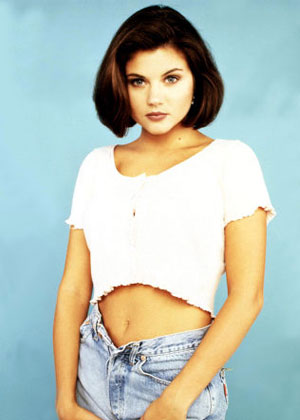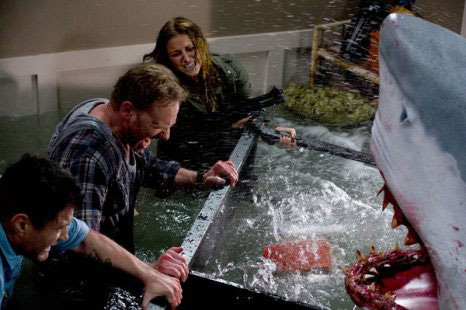Beverly Hills 90210’s Jason Priestley and Luke Perry reunited on Friday at Toronto’s Fan Expo to sign autographs and participate in a panel moderated by Entertainment Tonight Canada’s Roz Weston. Here are the highlights from the panel, including how they feel about notorious bad girl Shannen Doherty, fame and what it was like working with legendary television producer Aaron Spelling.
On Shannen Doherty (Brenda):
— Luke Perry and Jason Priestley started off by saying how many fans come up to them and ask if they still hang out with each other or other cast members but the first question people ask them is if “Shannen was really a bitch?”
— Despite Shannen’s “bad girl” reputation, they did have a lot of nice things to say about the actress. Perry hopes that despite all the negativity about the character that fans did enjoy his scenes with her. He adds: “She’s a fine actress and while we did have problems, I have no hard feelings towards her and have nothing but love for her.”
— Priestley agreed and explained that he and Shannen worked very closely for a long time and they had a great time together. He’s also worked closely with her as a director. “Shannen went through very difficult things in her life and unfortunately she brought a lot of the problems from her personal life to our place of work. As you know, you can’t let your personal life bleed into your professional life. Unfortunately, Shannen was letting that happen a little too often. She was just having a hard time and unfortunately we had to part ways with her.”
— Weston mentioned that while there was no Twitter at the time, the general fan consensus regarding Brenda was pretty negative and asked if they were aware that fans wanted Brenda off the show. Perry said that because their workload was so intense, he didn’t have time to read up on that stuff whereas Priestley said friends would deliver him copies of the “I Hate Brenda” newsletter: “It was kind of mean, but it was also kind of funny. That was the social media of the day.” Perry later joked that the Internet was invited for people to keep up with 90210.
On fame:
— Perry doesn’t like being famous but accepts the nature of what his life is. They each explained how fame happened real fast and quick – it freaked out everybody around them. No one really had been around anything like it before and people just started to behave differently. The pair, however, decided not to buy into it. “They’ll all scream and we’ll just go to work and not worry about any of this,” said Perry. They stuck to that and never got too competitive with each other and the rest of the cast regarding who got magazine covers or got to host Saturday Night Live. Perry actually hated being on magazine covers because the photoshoot would be during the weekends after a very long work week (they were producing 30 episodes rather than the standard 22). Perry continues, “You can’t let it [fame] drive you. You can never have any control over why you’re famous or how long you’re famous. So, I don’t worry about it.”
— Discussion later on reverts back to this subject with Perry adding: “I feel sorry for some of these kids [in the industry] today. They got too famous too quickly and they’re killing themselves. It’s a lot. If you come to Hollywood aspiring to be famous, it will kill you. You better come to do the work, otherwise, it won’t be that much fun.”
— Priestley compared it to a mountain climber: “The problem with getting to the top of the mountain is that you can get to the top of the mountain very quickly now because of the Internet. When you get to the top, there’s nothing to hold on to – there’s nothing but air. It’s just like that with being famous. You think that once you get famous, it’s going to fill this void inside of you. It’s like all of that love is going to make you feel a certain way or fulfill you, but it doesn’t. There’s nothing there at all. So you have to make sure that you’re driven by something else. If you’re driven by fame – it’s empty. Fame is hollow. Fame gives you nothing in return. The problem with the Internet is that people see it as a way to get famous. Is that all that’s driving you? It’s a hollow victory and it will drive you to your destruction.”
— Perry talks about recent interview where a bunch of kids in America were asked what they wanted to be when they grew up and 80% of them replied that they wanted to be famous. They didn’t say why or how. Priestley jokingly called it the “Kardashian syndrome.” Perry commented that those kids just want to be in that spotlight. Being famous is liquid and it’s changing and constantly evolving. They need to listen to the people who were famous before them and believe them that there’s not there. “It’s just you.”
On the show addressing social issues in the early seasons:
— Perry states that one of the show runners at the time, Charles Rosen, was very committed to the idea of doing socially responsible television and talking about issues (like unprotected sex in the age of HIV, drugs…) but what happened was that the powers that be [I imagine the network] came to realize that the viewers liked kids wearing those nice clothes and just getting together. So a lot of episodes would have to be about that going forward.
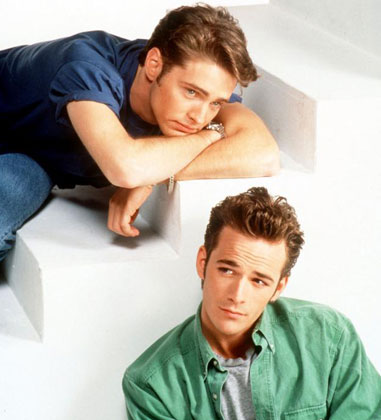
— On the bright side, Perry added that he usually meets second generation fans who have caught up thanks to reruns. He comes across situations where he’s told “My mom and I talked about those issues and we had never talked about that before,” usually about sexuality, drugs, bullying or not having that much self-confidence. Perry feels that in those situations, “TV has done a good thing and it’s not often that it does.”
— Perry also hated being referred to as a role model back then and still doesn’t: “I’m a guy on TV pretending to be someone else. Looking back, I tell my kids that those are actors. It’s the characters that we fall in love with. I always tell my children that the people you see doing those things on TV are designed to do that. They were written. But without pulling the cover of what entertainment is, I still want them to enjoy it. That [character or actor] isn’t a role model, but this is – I am your role model…But back then? I was 23 years-old and I didn’t have any kids!”
If anyone dated them hoping to actually date their character:
— Priestley says “Yes” and adds that they were horribly disappointed. “Girls thought they were going to date the virtuous Brandon Walsh and they were horribly disappointed. They would sit down for dinner with me and I’d order a Manhattan. They would like at me like ‘Huh? Don’t you want to start out with a Ginger Ale?’”
— Perry: “I would date girls who were expecting that bad boy and I would say, ‘You got him!’”
On Tiffani Thiessen joining the show as Valerie:
Perry: Tiffani brought a real shot in the arm to the show when she came. I think it’s because she only wore a bra and underwear the first time we saw her, right?
Priestley: And she wore them well.
Perry: Yeah!
On Aaron Spelling:
— Introduction of new characters were attributed to Spelling. He knew what and who the show need. Perry: “He could look at a show and say ‘This is what we need!’ and then go get it. I’m glad he did because he did that with my character. I would have never had a job otherwise. Aaron never lost his objectivity on a show. I’d sit there in his office and watch 7th Heaven with him when that first started and he’d be making notes and dictating them. He always kept his objectivity and went with a ‘This doesn’t work and here’s why’ approach.”
— Priestley adds: “My relationship with Aaron was very avuncular (uncle-like). He was a great friend and a great teacher. He taught me a lot about television and the way it works – how to tell stories. He also taught me how to polish off a bottle of vodka, which he was also very good at! Aaron was a great storyteller. He had very simple rules about how to tell a story and wanted to be aspirational, yet simple. Those rules of storytelling are just hallmarks of storytelling that a lot of producers follow today. He followed them from the moment he started in the 1960s until the moment he died.”
— Perry: “He did not set out to become the uber-rich television producer or world record holder that he was. It all sort of happened bit by bit. He thought about these other shows and started working on them and then suddenly he went from having six shows on the air to 7. Then, ABC belonged to him in the 1970s. But it wasn’t his intention, he just loved to tell stories. He would sit in his office and tell us stories. He’d come to the set or our dressing rooms and tell us stories. He was always just telling stories.”
— Priestley: “He was adored by his fans but he had a strange relationship with the critics. Critics hated him. They panned all his shows. He got the worst reviewed television shows throughout the 1970s and 1980s. Our show was no different! When Beverly Hills 90210 was first reviewed by the New York Times and the New York Post, we got scathing reviews…not only for the show, but us actors as well.
On Ian Ziering’s Sharknado:
— While they both admit they haven’t watched all of it, they do claim responsibility. Priestley: “We
are both sort of culpable for the Sharknado phenomenon because we were both responsible for the fact that Ian decided to do that movie. Ian had lunch with both of us independently and was saying, ‘Aw man, Syfy offered me this movie but it’s really bad!’ I was like, ‘Dude, you
gotta do that movie!’”
— Perry adds that “From what I have seen of Sharknado, if you find yourself outside and it’s raining big ass sharks, that’s the brother you want with a chainsaw!”
On working on a project together gain:
— Weston asked if someone walked up with a pile of money to get them all to reunite if it would happen. Priestley told him that Old Navy did that last year with their commericals. Perry answered that it would have to be the right thing and the important part is that they would like
to act together. He’d be okay with something like a panel, but he’d like to actually “work” with each other.

